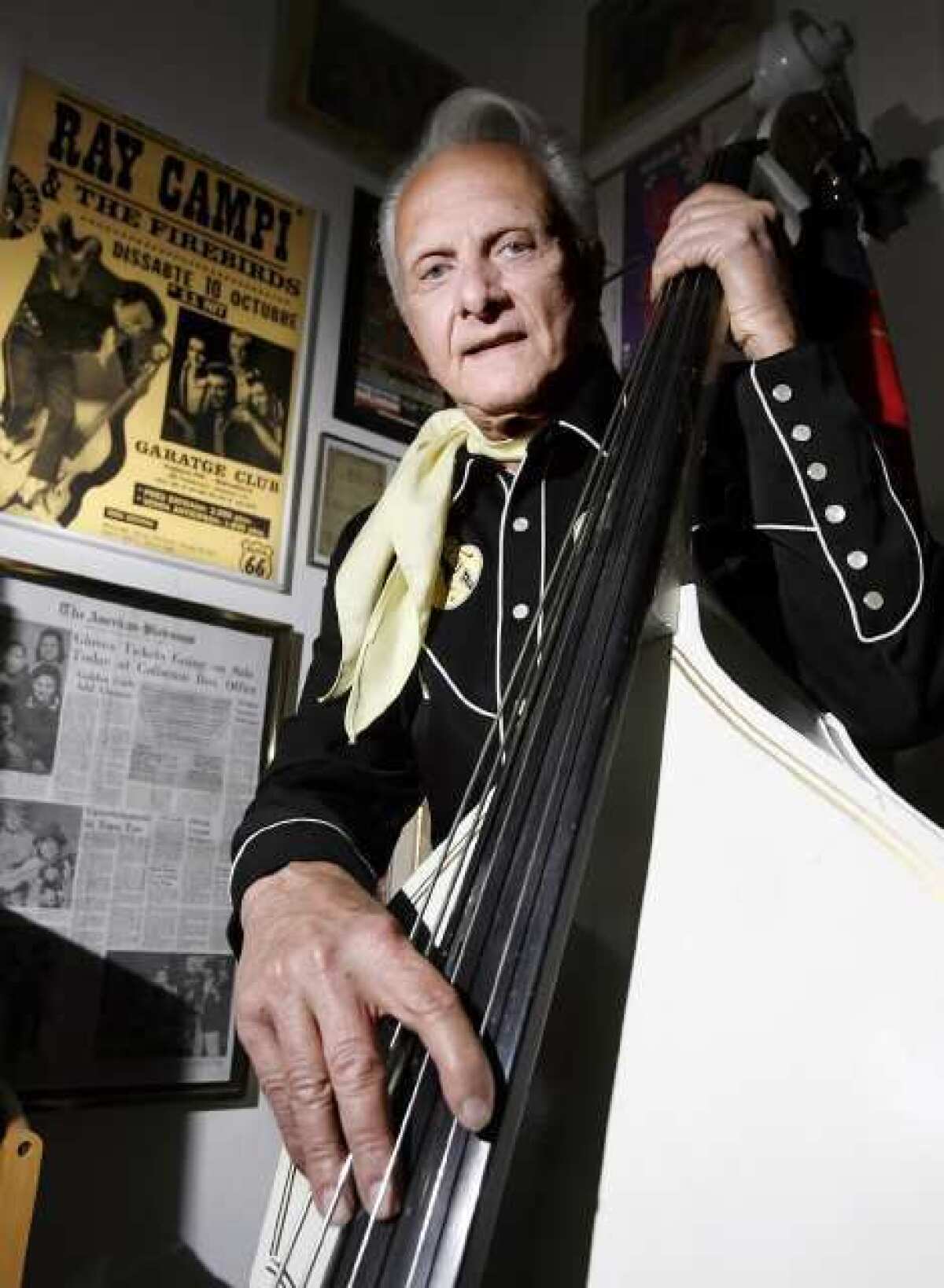Rockabilly rebel Ray Campi still stirs the fire

- Share via
Witnessing rockabilly originator Ray Campi in performance can be an unforgettable experience. Decked out in colorful, custom-tailored western wardrobe, letting fly with a biting vocal style reminiscent of a rebel war cry while balanced, mid-air, atop his full-size acoustic upright bass, one would never guess that the veteran singer-musician is fast approaching his 78th year.
Campi has always been a bundle of contradictions, one who has released 60 full-length albums, shared stages with the likes of Gene Vincent, Conway Twitty, Bob Luman and Sonny James, played to massive audiences at European festivals but has also worked as bowling alley pin setter, Ferris wheel operator, lingerie salesman and, for 30 years, as a high school teacher in Van Nuys.
The Austin, Texas-raised Campi, who will celebrate his 78th birthday with an April 21 performance at Burbank’s Viva Cantina, has indulged in a life-long romance with country and rockabilly. It’s taken him on a remarkable first-hand safari through American music. “I saw ‘em all,” Campi said. “I saw Hank Snow — he was such a fantastic singer and guitar player. I saw Hank Williams Sr. — in fact I still have the program guide from that night’s show.”
His life as a performer began while he was still in high school, when he formed his first band, Ramblin’ Ray & the Ramblers. While the Ramblers were a local success, with a healthy schedule of dance jobs and two regular radio shows, it wasn’t until local juke boxes began featuring records by the likes of Elvis Presley, Carl Perkins and Jerry Lee Lewis that Campi’s musical interests morphed into a full-blown avocation.
In 1956, he jumped headlong into the rockabilly revolution, recording prized classic “Caterpillar,” a record that did well locally but never gained a national audience. A series of additional 45 releases followed (“It Ain’t Me,” “My Screamin’ Screamin’ Mimi”), on labels such as the San Antonio indie TNT to the prestigious Dot imprint, but as Campi recently said, “The music business was always cruel, especially to a bunch of kids.”
Like many of his fellow rockabillies, Campi headed West to California, settling in Los Angeles in 1959, just as the genre began to wane in popular favor. But Campi persevered and re-emerged in the mid-1970s as part of the Rollin’ Rock Records roster, a tiny Los Angeles label that both reissued classic rockabilly and released newly made recordings by the likes of Campi and fellow Texas rockabilly spearhead Mac Curtis.
While Campi, along with such youthful cohorts as Ronnie Mack and Billy Zoom (later to join classic punk band X), seemed as out of place as Martians when they hit stages at Hollywood rock clubs, a burgeoning rockabilly revival soon reignited Campi’s career.
“I’ve never had any real big back-slappin’ moments, like winning a Grammy award or some other so-called great accomplishment,” Campi said. “But when we went to Europe in ’77 on the Rollin’ Rock package tour, bringin’ real rock ‘n’ roll back to England — which had left years before with the death of Eddie Cochran and the injury of Gene Vincent — it was a big deal.
“People went crazy, we drew huge, enthusiastic crowds, we even went on the BBC, performed live and played records on the air. It was pretty exciting, because we were unknown in America and nobody gave a damn. But, all of those moments, when the fans come up to thank you for playing this music, It was wonderful.”
Campi, and Rollin’ Rock Records, played a critical role in both reintroducing the rockabilly style and igniting a cult revival movement that still thrives today. When he starts slapping that doghouse bass fiddle at his birthday show on Saturday, it will be as pure a dose of passionate, uncut rockabilly as you’ll hear anywhere.
“There’s so little money in it, but if I had it to do all over again, I wouldn’t change a thing,” Campi said. “People act like if you don’t sell a million records, you’re a failure, but success is hard to define. My phone rings, and I’ll be on my way to England or Finland. I’m turning 78 next week and I’ve still got my hair! So, I do consider myself a success.”
JONNY WHITESIDE is a veteran music journalist based in Burbank and author of “Ramblin’ Rose: the Life & Career of Rose Maddox” and “Cry: the Johnnie Ray Story.”
Ray Campi performs at Viva Cantina, 900 W. Riverside Drive, Saturday, April 21, 10 p.m. No cover charge. (818) 845-2425.